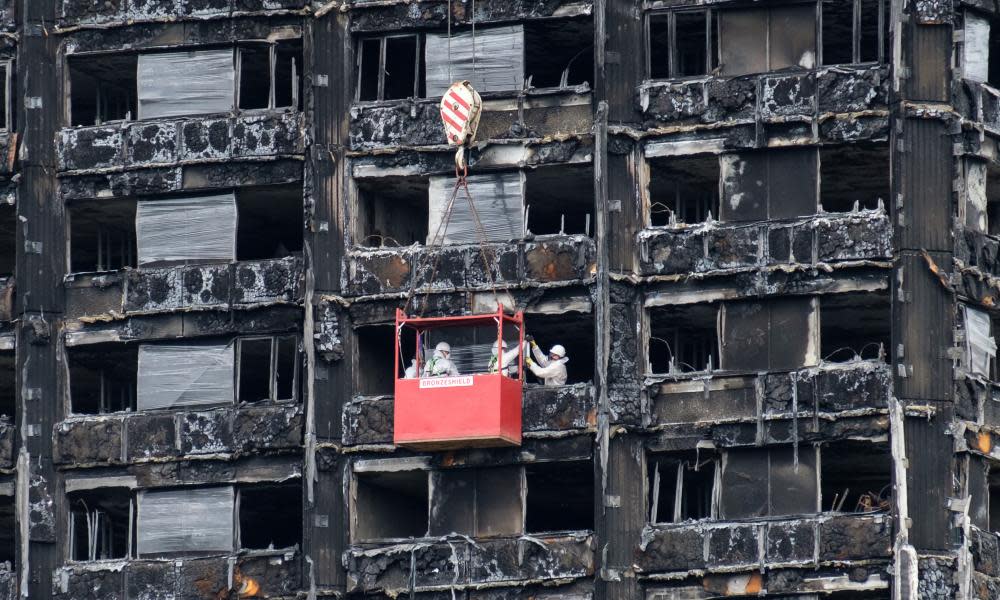Fire chief criticises terms of inquiry into Grenfell Tower blaze

The head of the Fire Brigades Union, whose members rushed to save Grenfell Tower residents, has criticised the failure to have the judge-led inquiry into the disaster look at its social and political context.
Matt Wrack said that under its current terms the investigation would fail to answer crucial questions. He said it seemed designed to protect Whitehall from scrutiny and would exacerbate the hurt felt by survivors and the families of those who died.
“The prime minister was subject to severe criticism in the days after the fire. Since then, we have seen the start of a campaign to protect the government and place the blame anywhere else, anywhere but Whitehall,” he said on Wednesday.
Theresa May accepted the terms of reference put forward by the inquiry’s chair, the former court of appeal judge Sir Martin Moore-Bick, on Tuesday. Moore-Bick begins work this week on examining the immediate causes of the fire and its spread, and the design and refurbishment of the tower.
His inquiry will also look at the regulations and fire safety measures in place at the time of the blaze, in which at least 80 people died, the council’s reaction to similar emergencies, the actions of the London fire brigade on the night and the immediate responses of central and local government.
Moore-Bick came under pressure to also look at the social and political conditions in which a disaster such as Grenfell was able to happen, including the provision of social housing in the UK. He told May, however, that such issues were “not suitable for a judge-led inquiry”, though he said they could be covered by another process operating in parallel.
In response, Wrack said: “How is it remotely possible to seriously examine the causes, spread and results of the fire without examining ‘social, economic and political’ matters?”
He called the decision a “mighty kick of some really fundamental issues into some very long grass”. “There is clearly no intent from government for any wider inquiry or serious debate,” he said.
The FBU argued for a broader inquiry, including a consideration of the advice given to, and actions taken by, government ministers.
Wrack said: “Central government has created the housing and fire safety regime and central government must be held to account for any failings in it. Yet the terms of reference signed off by Theresa May appear designed to avoid this.”
He said the inquiry should not focus simply on the actions of a local authority or contractor. “It is about the overarching regime, the political climate under which they operate. People across the world are asking how, in the UK, it is possible to apply flammable systems of cladding to residential tower blocks.
“The risk in Moore-Bick’s terms of reference is that the inquiry is able to avoid probing deeper to examine the regime which allowed these deaths to happen, conveniently taking the spotlight off government ministers and any policies that were or weren’t in place that may have had an impact.”
He said investigations by the fire service and police could answer questions about how the fire started and spread, as well as who signed off work on the building.
“These are all essential parts of the jigsaw. But they miss crucial questions. Firefighters attending the incident were initially struck by the fact that a fire of that nature was impossible. If the agency responsible believes a fire on this scale to be so impossible that it has made no plans to react on such a scale, Moore-Bick is missing a blatantly obvious question: how could this even happen?”
May’s spokesman declined to comment. A spokesman for the inquiry said Moore-Bick’s reasoning for recommending the narrower terms of reference was set out in his letter to the prime minister.
Wrack’s comments were made as London Fire Brigade (LFB) was forced to deny it had signed off on the refurbishment plans at Grenfell before the devastating blaze.
The organisation was responding to claims made in an article published by the BBC that referred to documents that say there was “close liaison” between the fire brigade and Kensington and Chelsea Tenant Management Organisation (KCTMO) “throughout the duration” of the renovations.
It claimed that firefighters were shown the “fire safety features” of the building after the work – including the installation of flammable cladding – was completed last summer.
However LFB said it does not have the legal powers to inspect cladding or structural changes. Asked if LFB had been consulted on any aspect of the refurbishment, and specifically the cladding, a spokesperson told the Guardian: “We are not going into that detail because it is going to form part of the public inquiry. But we want to give people an understanding of what our role is within the law.”
In a statement LFB said: “We do not ‘sign off’ on refurbishment and we only have legal powers to act where we see internal fire safety problems such as compromised fire doors and combustible materials on staircases.
“While firefighters regularly visit local buildings to familiarise themselves with the layout and the firefighting equipment, such as hydrants, this is not the same as making a detailed inspection of a building refurbishment especially when many of the changes would sit outside of our powers.
“We are unable to confirm exactly what contact we had with [KCTMO] regarding the tower because this is now subject to a public inquiry.”
The refurbishment of the tower is one area being considered by the Moore-Bick’s inquiry. During the £8.6m renovation, new cladding with a flammable core was wrapped around the tower, along with combustible insulation.
It is suspected the combination of these materials helped aid the spread of the inferno, which engulfed the building within minutes.

 Yahoo News
Yahoo News 
